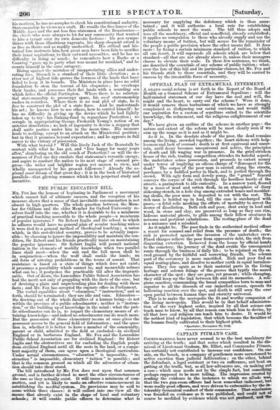111..a PUBLIC EDUCATION BILL.
Mn. Fox has the honour of beginning in Parliament a movement which cannot fail of ultimate success, and the reception of his measure shows that a sense of that inevitable consummation is not absent in high quarters. The whole question between the Mem- ber for Oldham and the older Member for Oxford University re- solves itself into the one, whether it is desirable to fix a minimum of practical teaching accessible to the whole people—a maximum of popular ignorance ? Sir Robert Inglis and the school to which he adheres would have no general plan of secular teaching unless it were tied to a general method of theologioal teaching; a -union which, in this sect-divided country, proves to be actually impos- sible: by choosing to ignore the impossibility and maintain the con- dition, Sir Robert and his friends practically insist on maintaining the popular ignorance. Sir Robert Inglis will permit national tuition in the elements of worldly knowledge when two parallel lines shall meet—when the sun and the full moon shall be in conjunction—when the wolf shall suckle the lamb; an old form of uttering prohibitions in the terms of assent. That resistance is based on a state of things which does not exist; it presumes a possibility which cannot be, and meanwhile refuses what can be ; it postpones the practicable till after the impracti- cable. Out of doors, the Lancashire Public School Association has had the merit not only of grappling iwth the facts of the case, but of devising a plain and unpretending • nc plan for dealing with those Lasts; and Mr. Fox has accepted the (*gnat° office in Parliament
The verbal squabbles about "education," "instruction," and so forth, should be terminated; they are idle and vain. Education— the drawing out of the whole faculties of a human being—is not within the province of a public schoolmaster ; neither is "instruc- tion," or the building up of knowledge in the mind : what the pub- lic schoolmaster can do is, to impart the elementary means of at- taining knowledge—and indeed no schoolmaster can do much more. But the possession of those elementary means at once gives the possessor access to the general field of information ; and the ques- tion is, whether it is better to have a member of the community-,
paz,gent or child, admitted to 'the field or excluded—in civilized land or in barbarous England. Mr. Fox and the Lancashire Public School Association are for civilized England : Sir Robert Inglis and the obstructives are for excluding the Paglish people from civilized England until all the sects in the land, or a compe- tent majority of them, can agree upon a theological curriculum. -Under actual circumstances, " education " is impossible, " in- struction " is impossible, elementary " tuition " is possible; and that is the common ground an which all the advocates of educa- tion should take their stand.
The bill introduced by Mr. Fox does rest upon that common ground, and is further devised to meet the other circumstances of the ease as they actually exist It will cause a minimum of corn- notion, and yet is likely to make an effective commencement in establishing the needful system. Its provisions may be said to come within three classes: it -will collect into one view all the weans that already exist in the shape of local and voluntary schools it will -enable public officers to determine what is necessary for supplying the deficiency which is thus ascer- tained; and it will authorize a local rate for establishing public schools to meet the want. The bill thus adopts and uses all the machinery, official and nonofficial, already established; it applies no compulsion to those who already supply and use the voluntary means of 'tuition, but will secure for the remainder of the people a public provision where the other means fail. It does more : by 1lvin a certain minimum standard of tuition, to which all can resort, it will supersede all schools which are below that standard—all that are not already above it, unless their managers choose to elevate their scale. In these few sentences, we think, are described the essentials of any scheme of public tuition : what- ever the fate of this bill and its particular clauses, let Mr. Fox and his friends stick to those essentials, and they will be carried to success by the irresistible force of necessity.
























 Previous page
Previous page